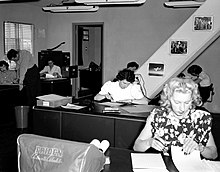
The term "computer", in use from the early 17th century (the first known written reference dates from 1613),[1] meant "one who computes": a person performing mathematical calculations, before calculators became available. Alan Turing described the "human computer" as someone who is "supposed to be following fixed rules; he has no authority to deviate from them in any detail."[2] Teams of people, often women from the late nineteenth century onwards, were used to undertake long and often tedious calculations; the work was divided so that this could be done in parallel. The same calculations were frequently performed independently by separate teams to check the correctness of the results.
Since the end of the 20th century, the term "human computer" has also been applied to individuals with prodigious powers of mental arithmetic, also known as mental calculators.
- ^ "computer". Oxford English Dictionary (Third ed.). Oxford University Press. March 2008.
1613 'R. B.' Yong Mans Gleanings 1, I have read the truest computer of Times, and the best Arithmetician that ever breathed, and he reduceth thy dayes into a short number.
- ^ Turing 1950.